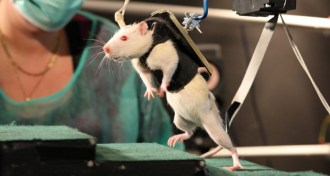
Laura Sanders
Senior Writer, Neuroscience
Laura Sanders reports on neuroscience for Science News. She wrote Growth Curve, a blog about the science of raising kids, from 2013 to 2019 and continues to write about child development and parenting from time to time. She earned her Ph.D. in molecular biology from the University of Southern California in Los Angeles, where she studied the nerve cells that compel a fruit fly to perform a dazzling mating dance. Convinced that she was missing some exciting science somewhere, Laura turned her eye toward writing about brains in all shapes and forms. She holds undergraduate degrees in creative writing and biology from Vanderbilt University in Nashville, where she was a National Merit Scholar. Growth Curve, her 2012 series on consciousness and her 2013 article on the dearth of psychiatric drugs have received awards recognizing editorial excellence.

Trustworthy journalism comes at a price.
Scientists and journalists share a core belief in questioning, observing and verifying to reach the truth. Science News reports on crucial research and discovery across science disciplines. We need your financial support to make it happen – every contribution makes a difference.
All Stories by Laura Sanders
-
 Health & Medicine
Health & MedicineNews Briefs: Body & Brain
How deaf people process other senses, a gene variant that protects against Alzheimer's, and special cells that wrap and feed neural extensions
-
 Health & Medicine
Health & MedicineThe Brain Set Free
Lifting neural constraints could turn back time, making way for youthful flexibility.
-
 Health & Medicine
Health & MedicineEcstasy may cause memory problems
New users of club drug do worse than nonusers on one recall test.
-
 Health & Medicine
Health & MedicineMemories clutter brain in amnesia
Complex patterns slow down object recognition in patients with disorder.
-
 Health & Medicine
Health & MedicineSome brains may be primed for pain
When people keep hurting long after an injury heals, a process similar to addiction may be at work.
-
 Health & Medicine
Health & MedicineBody and Brain
Good touch, bad touch A leg caress can delight or feel totally skeevy, depending on who’s doing the caressing. A touch’s emotional baggage can be seen in the brain’s initial response to that touch, scientists report in the June 19 Proceedings of the National Academy of Sciences. Heterosexual men’s somatosensory cortices, brain regions that detect […]
-
 Health & Medicine
Health & MedicineLearn to play piano in your sleep
That’s still impossible, but an experiment suggests hearing a previously learned ditty while snoozing improves later performance of the piece.
-
 Health & Medicine
Health & MedicineLike a prion, Alzheimer’s protein seeds itself in the brain
Injecting amyloid-beta into mice may induce misfolding of native amyloid-beta molecules, leading to the buildup associated with the neuron-killing disease.
-
 Humans
HumansColor this chimp amazing
An extra layer of sensory perception called synesthesia might help ape make a monkey of humans on memory tests.
-
 Health & Medicine
Health & MedicineWhy antipsychotics need time to kick in
Insight into how some schizophrenia drugs work may explain why compounds that build up in the brain can take weeks to provide relief.
-
 Life
LifeTreatment helps paralyzed rats walk
A combination of drugs, electrical stimulation and therapy can restore lost connections between lower limbs and brain.
-
